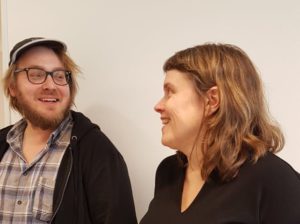Some time ago I met with Åse Hedemark and Ulrika Kjellman* to ask them a few questions about the thought behind the Master Programme in Digital Humanities and the relevance of the education for students.

Åse and Programme Coordinator Olle Sköld discusses digital cultural heritage in their planning of the programme. I was not fast enough with the camera to include Ulrika in the picture, hopefully will succeed better next time!
What are the rationales for starting an education in digital humanities at UU?
Ulrika: The department of ALM have hosted a master programme in Archive, Library and Museum Studiesfor nearly two decennia and during this period we have experienced considerable changes regarding digital techniques and tools.
Åse: In today´s digital society it is important that people are educated of how computer-supported methods can be used to study digital materials from societies and cultures both current and past. We need to understand how digital technologies function in scholarly work, organizations, and the everyday life of people.
Ulrika: With this in mind it seemed more and more urgent to launch some kind of education at Uppsala University (UU) to address these new phenomena. Fully aware of that many disciplines within UU touched upon these issues in their regular courses it still seemed like a more thorough and overall grasp was lacking, an overall grasp that not only could link what was already running at UU (within the program the student can choose to take courses that other departments already give) but also present students with an opportunity to get a more systematic understanding of the digital humanities. Since the department of ALM both have many scholars with an interest in digital humanities, and also already addresses some of these issues within the ALM-master program, it seemed like a good idea to offer our department as host of this new master programme in digital humanities. And since the faculty administration was all positive when I presented the idea to them a couple of years ago and has since been giving us full support in implementing the programme, and since many of our co-workers has been very engaged in this work – Olle Sköld, Åse Hedemark, and Anna Orrghen who have put a great effort in implementing the programme, and Ina-Maria Jansson and Amalia Juneström to marketing it – we all have a good feeling that this will end up just greatly.
What will the programme contain?
Åse: The first year of the programme contains compulsory courses providing a broad range of knowledge in the theoretical, practical and technical aspects of digital humanities. Digitisation, visualisation of different types of data, such as images and artefacts, and methods for how digitised material can be analysed and conveyed are central focuses. Year two includes significant opportunities to personalize and specialize the courses according to the students disciplinary background.
Ulrika: On our web site, you find a good presentation of the content of the programme.
As a student at the programme in digital humanities at the Department of ALM, what can you expect of teachers and the department of ALM in regard of making your time in the programme the best possible?
Ulrika: I would like to ensure all future students that they will meet engaged teachers with a lot of knowledge representing different aspects of digital humanities. And they will also be a part of an interesting and engaging milieu, both here at the department of ALM, and at UU as a whole.
Åse: Yes, teachers at the department om ALM are excited about the Masterprogramme in Digital Humanities and are very much looking forward to meet all new students. They will do their very best to make the time in the programme the best possible. If you have any questions don´t hesitate to contact us!
*Ulrika Kjellman is Head of the Department of ALM and Åse Hedemark is Director of Studies for the Master Programmes in Archive, Library and Museum Studies and Digital Humanities.
